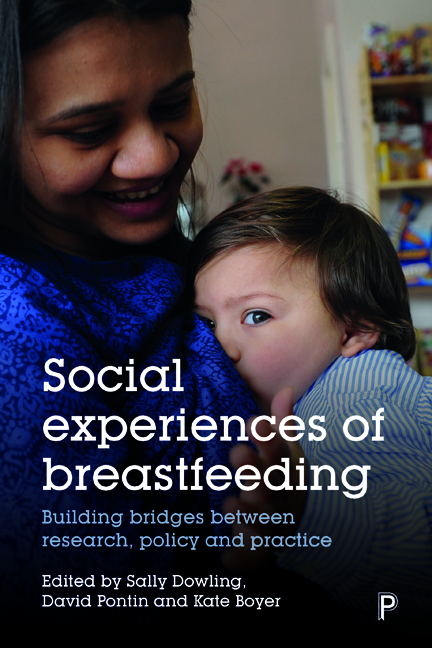Book contents
- Frontmatter
- Dedication
- Contents
- List of tables and figures
- Notes on contributors
- Acknowledgements
- Introduction
- The UK policy context: reconfiguration of the Unicef UK Baby Friendly Initiative to reflect the importance of relationships and ensuring sustainability
- Part I Breastfeeding and emotions
- Part II Cultures of breastfeeding
- Part III Breastfeeding and popular culture
- Conclusion
- Appendix: Schedule for ESRC Seminar Series: Social Experiences of Breastfeeding: Building bridges between research and policy, 2015–16
- Index
Breastfeeding and emotions: reflections for policy and practice
Published online by Cambridge University Press: 22 April 2022
- Frontmatter
- Dedication
- Contents
- List of tables and figures
- Notes on contributors
- Acknowledgements
- Introduction
- The UK policy context: reconfiguration of the Unicef UK Baby Friendly Initiative to reflect the importance of relationships and ensuring sustainability
- Part I Breastfeeding and emotions
- Part II Cultures of breastfeeding
- Part III Breastfeeding and popular culture
- Conclusion
- Appendix: Schedule for ESRC Seminar Series: Social Experiences of Breastfeeding: Building bridges between research and policy, 2015–16
- Index
Summary
Introduction
We found a wealth of rich material in these chapters, enough to fuel many conversations and stimulate much reflection. Faced with the constraints of bringing all of this together for one short reflective chapter, we decided to focus on the aspects of the chapters which are the most relevant to the public health outcomes that are the focus of our professional roles, namely, breastfeeding prevalence at six weeks and supporting good perinatal mental health. In particular, we were drawn to the issues of guilt and shame, especially when breastfeeding does not go well, that were discussed by Dawn Leeming and Lisa Smyth (Chapters One and Two). We met to discuss the chapters, and both found that Dawn's insights drawn from the psychological literature helped us make sense of our experience in practice. We’ve shared some of our conversations below:
Sally T: The distinction Dawn makes between shame and guilt was new to me. I had not given it much consideration before hearing her lecture.
Sally J: This distinction was also new to me. Dawn presents a convincing argument for developing awareness of and sensitivity to those who experience internalised and sometimes intense feelings of shame. However, she balances this with a helpful warning about the dangers of not ‘overstating’ the ‘possibility of shame’. It's important not to overgeneralise, particularly when considering population health.
We were both interested in the ideas Dawn identified from the research on how to help new mothers avoid and resist feeling shame. This became a focus of discussion.
Realistic breastfeeding promotion and education
Sally J: The tide is definitely shifting away from public health campaigns that have ‘breast is best’ type messages at the centre, but rather promoting services that support women, some of whom may not find it easy to establish breastfeeding. One local campaign, promoting the message of ‘go with the flow’ was directly inspired by the breastfeeding seminar series. It was intended to challenge the idea of getting your baby into a routine, an idea that in some bestselling books on parenting is synonymous with ‘good mothering’, and to promote responsive feeding and sensitive, attuned baby-led parenting.
- Type
- Chapter
- Information
- Social Experiences of BreastfeedingBuilding Bridges between Research, Policy and Practice, pp. 87 - 94Publisher: Bristol University PressPrint publication year: 2018



